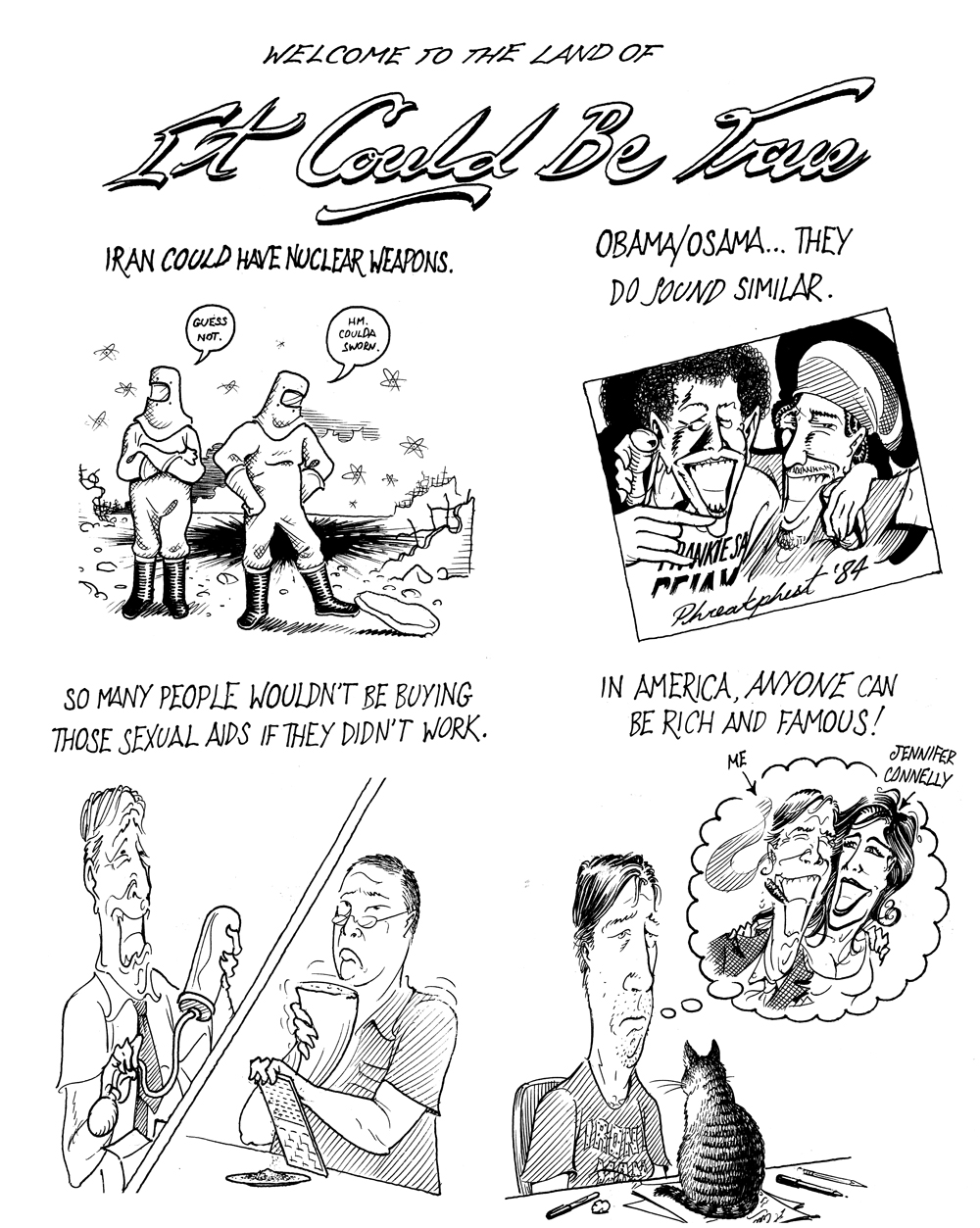Artist's Statement I'm just going to have to go ahead and apologize for this cartoon up front. I had only a few hours in which to draw it—or, rather, if we want to be honest about it, I had the usual number of hours but only availed myself of about three of them. Between moving into my new turret in New York and driving back to Baltimore for Webmaster Dave’s bachelor party I just did not have any time to get started on the cartoon until early Monday morning, a few hours before my absolutely final deadline. Anyway, the idea is fine, but the execution is embarrassingly hasty and indifferent. The only really inspired detail is the inclusion of the FRANKIE SAY RELAX T-shirt, one of those touches that would’ve occurred to me in greater numbers had I given myself enough time. This cartoon idea was handed me by the evil Ben Walker, formerly of Your Radio Nightlight and The Theory of Everything, with whom I had a cautious rapprochement last week following yet another of our bitter fallings-out a year ago. We drank Belgian ales, smoked cigars, and ogled girls in Tompkins Square Park as he told me about a recent New Yorker article (“State Secrets,” by Patrick Radden Keefe, in the April 28 2008 issue) about the absurd and frightening Catch-22 aspects of the government’s hunt for domestic terrorists. It is one of those persecutory spasms like the witch hunts, Stalinist purges, McCarthy hearings, and Cultural Revolution in which, as Gibbon puts it in describing a similar period in Roman history, “suspicion was equivalent to proof; trial to condemnation.” The passage that especially caught Ben's attention was:
It is Ben’s talent to seize on such lines as metaphors (like the amazing “If I’d known it was harmless, I would’ve killed it myself,” in Philip K. Dick’s A Scanner Darkly). Neither Ben nor I are the first to have noted the decline of empirical fact’s street cred in our culture. With the glut of fabulous and intriguing misinformation available online, there are so many antifactoids clamoring for our attention—the cloud of smoke over the field in Pennsylvania where flight 94 went down is the wrong color for a jet fuel fire! Orson Welles made a Batman film! Look, it’s Jenna Bush’s crotch!--that the few humble, genuine facts in there are likely to get trampled and ignored, like the one genuinely excellent girl in a bar full of waxed and silicone skanks. I’ve groused before about the media’s complicity in this tendency--bringing on a climatologist to tell us that global warming is real and anthropogenic, then countering him with an oil industry ringer to say that it’s all a lotta hooey, and concluding: well, who knows? Creationists, unable to muster much in the way of supporting proof for their big-bearded-man-in-the-clouds cosmological hypothesis, switched tactics to “teaching the controversy,” in an attempt to give the very fact that they continue to believe in nursery-school stories the weight of a body of evidence. Their belief becomes the evidence. What’s scary is that this tendency has become a policy-making tool. We went to war and killed a hundred fifty thousand people over the incorrect suspicion that Iraq was harboring biological or chemical weapons. As my friend Carolyn always says about her devastated ex-boyfriends: Oh, well! It seems we may well do the same thing all over again only five years later in Iran. (Hillary Clinton, pandering to the Cylon vote, has made known her willingness to nuke Tehran in case we develop a really worrisome suspicion that they might be harboring nuclear weapons.) Ben also believes that this same blanket credulity explains American’s bottomless Horatio Alger-like faith in the American Dream, which is why even people toiling away in ludicrously obscure and marginal occupations like cartooning can continue to nurture delusions of celebrity and fortune. Hey--it could be true! |
.gif)

